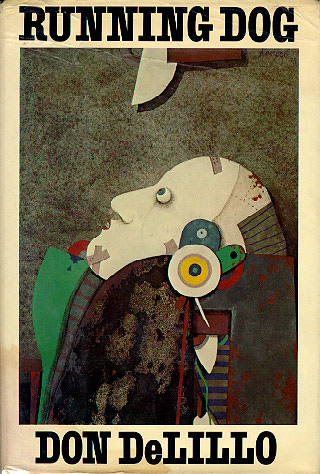

This page lists the known reviews of Don DeLillo's 1978 novel, Running Dog.
Boston Globe: September 10, 1978 - review of Running Dog by Margaret Manning
But conspiracies, after all, are only incomplete systems, inadequate explanations of the world; DeLillo's conspiracies always deflate, letting entropy sneak in around the edges.
"The less there is," says a character in Running Dog, "the more you're tested to find the things that do exist." It is a test for reader and writer alike, one that DeLillo does not manage well in this new novel. Narrowed, flattened and polished, Running Dog reads too much like some compacted version of the literary waste - the intrigue - from which DeLillo has presumably meant to separate it with artful reduction. But because Running Dog features the contractive method that worked in the earlier books, especially Players, it remains an interesting novel, an experimental coda to a major writer's career.
This is a romantic novel in the gritty, precisionist, enigmatic modern mode ("All conspiracies begin with individual self-repression"). Mr. DeLillo is in full command of that limited form, and his book, though obscure as to purpose, is a full pleasure to read.
But the major limitation of the book is also its most interesting feature. "I guess I miss conspiracy," Moll's editor tells her when she hears about Moll's early findings for her sex story. "A sense of evil design." Later there is conspiracy aplenty, but the energies of evil remain absent. These are just tired dealers and double-dealers, habitus of manipulation, and the work itself has an air of weariness, of routine violence and acceptable paranoia, of intrigue without point or profit, which strikes me as a very accurate reflection of a contemporary mood. Plots everywhere, all half-hearted, most misfiring.
The naiveté of this American picture, itself a symptom of post-Vietnam shock, is belied by the sophistication of DeLillo's verbal technique. The cutting is as rapid as that found in Eisenstein's October and often as confusing: With so little delineation of either character or mise en scène, things tend to run together, as in a dropped bag of rotten fruit. I came to Running Dog after a re-read of Mann's Doctor Faustus - a more terrible picture of evil, since in that book evil corrupts the good - and found DeLillo's work a refresher course in the readjustment to contemporary literary values. There is something of Pynchon it it, and a little of John Hawkes. DeLillo has his own voice, harsh, eroded, disturbingly eloquent.
If the conspiracy novel has become enormously popular, it has become correspondingly difficult to write well. Norman Mailer has pointed out that paranoia becomes common sense as the world goes insane; each morning's headlines threaten to outreach the fantasy and outrage of fiction.But Don DeLillo, who has proven himself a master of the menace in everyday situations with such frightening novels as Great Jones Street and Players, has done it again. We are lulled by the ease of his craft into regarding the most gore-sodden horrors as natural outcomes, the most malicious liasons (sic) as sensible partnerships.